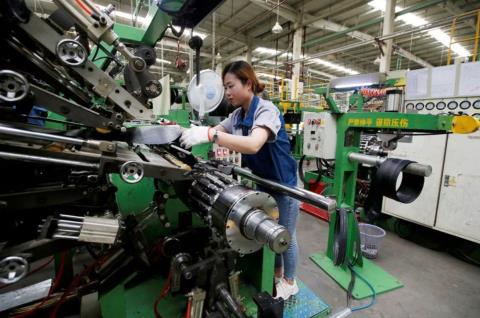
The OECD also warned of potential risks including China’s slowdown sharpening and knock-on effects in the event of a no-deal Brexit
For the eurozone in 2020, the OECD cut its forecast to 1.2 percent, down 0.4 points from its last outlook report
PARIS: Global trade tensions and political uncertainty are weighing on the world’s economy, the OECD warned Wednesday, cutting its global growth forecast for this year to 3.3 percent, down from the 3.5 percent it predicted in November.
The Organization for Economic Co-operation and Development, which groups the world’s top developed economies, also warned of potential risks including China’s slowdown sharpening and knock-on effects in the event of a no-deal Brexit.
“High policy uncertainty, ongoing trade tensions, and a further erosion of business and consumer confidence are all contributing to the slowdown,” the Paris-based OECD said in an interim version of its Economic Outlook.
The OECD revised growth downwards in almost all of the countries in the G20 group of industrialized and emerging nations.
The 19-nation eurozone was particularly hard hit, with predicted growth dropping from 1.8 percent to one percent.
The growth forecast for European powerhouse Germany sunk to 0.7 percent from 1.4, while Italy’s was slashed from 0.9 percent to -0.2.
The OECD said the sharp downturn in the two countries reflected “their relatively high exposures to the global trade slowdown compared with that of France,” which dropped from 1.5 percent to 1.3.
Britain’s forecast was chopped to 0.8 percent from 1.4 — but the OECD emphasized that this projection was based on the assumption of a smooth Brexit.
If Britain crashes out of the EU without a deal — the two sides are currently in talks ahead of the scheduled leave date on March 29 — the OECD said its outlook would be “significantly weaker.”
“OECD analysis suggests that the increase in tariffs between the two economies as a result of WTO rules coming into effect would reduce GDP by around two percent (relative to baseline) in the United Kingdom in the next two years.”
It also warned a disorderly Brexit “would raise the costs for European economies substantially.”
“Although contingency measures to soften the impact of a no-deal outcome are being taken by both sides, UK-EU separation without an agreement would still be a major adverse shock for Europe and possibly elsewhere in the world.”
For the eurozone in 2020, the OECD cut its forecast to 1.2 percent, down 0.4 points from its last outlook report.
Trade restrictions imposed last year — most notably by the United States and China — are “a drag on growth, investment and living standards, particularly for low-income households,” the OECD said in its report.
The world’s two biggest economies are in the middle of trade negotiations, but the OECD warned that other risks remain even if they do reach a deal, including potential US tariffs on European car imports.
“This would hit Europe particularly, where motor vehicle exports represent around one-tenth of total EU merchandise exports to the United States,” the OECD said.
Growth for China, which is facing an economic slowdown, was revised down slightly to 6.2 percent from 6.3 percent for this year and steady at six percent for 2020.
But the OECD warned that “a sharper slowdown in China would hit growth and trade prospects around the world.”












